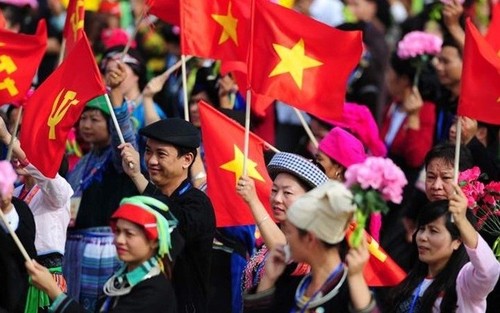 (Phôt: tuyengiao.vn) (Phôt: tuyengiao.vn) |
The assessment in the US State Department’s “2022 Country Report on Human Rights Practices” was influenced by personal opinions and prejudices, and is not strictly based on objective, scientific facts, data, and evidence.
The report mentions a number of specific individuals who are in fact opponents of the State, taking advantage of the cover of "democracy" and "human rights" to sabotage Vietnam and subvert national security and social order.
The report accuses Vietnam of carrying out arbitrary arrests, unjust convictions, repression, illegal invasion of privacy, and infringement of privacy. freedom of speech, and internet freedom.
Objective, accurate assessment of human rights in Vietnam is needed
The report misjudges the nature of the human rights issue in Vietnam. Protecting human rights in Vietnam does not mean allowing individuals to take advantage of democracy and human rights to violate sovereignty, national interests, or collective and individual interests, or to subvert security and social order. In Vietnam democracy and human rights must be in harmony with the overall development of society and safeguard the highest interests of the nation.
To objectively, correctly assess the human rights situation in Vietnam, the US Department of State needs to base its assessment on reliable, accurate information and data. The collection of evidence should be verified by Vietnamese authorities who have complete and authentic information and documents.
There should also be clear, transparent criteria for validating information, which should be applied before publication. So far, clear criteria for assessing the human rights situation is have been absent and the US State Department should not arbitrarily publish its own views based on unofficial information sources of the human rights situation in other countries, like Vietnam.
Deputy spokesperson for Vietnam’s Ministry of Foreign Affairs Pham Thu Hang said: "Vietnam is sorry that the “2022 Country Report on Human Rights Practices” of the US Department of State makes some subjective statements based on inaccurate information about the actual situation in Vietnam. Vietnam is always ready to have frank, open and constructive discussions with the US about their differences in order to increase understanding and contribute to the development of the comprehensive partnership between Vietnam and the US."
Vietnam pursues a consistent policy of protecting and promoting human rights.
Article 3 of the 2013 Constitution stipulates: “The State guarantees and promotes the people's right to mastery, recognizes, respects, protects and guarantees human rights and citizen rights, and implements the goal of rich people, strong country, democracy, justice and civilization, where everyone has a prosperous, free and happy life and has conditions to develop comprehensively.”
On the basis of the Constitution, Vietnam has introduced many laws to protect and promote human rights such as the 2016 Law on Beliefs and Religions, the 2018 Law on Cybersecurity, and the 2016 Law on the Press. These laws play an important role in ensuring basic rights for citizens, and protecting freedom of speech, belief, religion and privacy.
In practice, despite many difficulties, human rights are always respected and guaranteed by the Vietnamese Party and State. In the spirit of "leaving no one behind", Vietnam has brought into play the strength of the entire political system to realize the goals of economic and social development, hunger eradication, poverty reduction and human development in accordance with international commitments. Vietnam's achievements in ensuring human rights have been internationally recognized and praised.
Vietnam is ready to hold dialogues on differences on human rights
Since normalizing and establishing diplomatic relations in 1995, Vietnam and the United States have promoted bilateral cooperation on a basis of mutual trust and respect. Currently, the bilateral relationship is developing comprehensively in politics, economy, security, culture, and people-to-people exchanges.
The Vietnamese Party and State are always ready to hold dialogue and frankly, openly, and constructively discuss differences with the US in order to enhance mutual understanding.
Deputy spokesperson Pham Thu Hang said: 'In the 10 years since establishing a comprehensive partnership, the relationship between Vietnam and the US has developed deeply, effectively and substantively. The two countries maintain contact, dialogue and exchanges of delegations at all levels, particularly high-level visits. We are eager and ready to cooperate with the administration of President Joe Biden to promote bilateral ties in an effective, sustainable manner for peace, stability, cooperation and development in the region and the world."
One of the main barriers in the Vietnam-US relationship is a difference of opinion on human rights, democracy, ethnicity, and religion. In recent years, the two countries have worked closely to remove these barriers through negotiations and information exchanges. The two aim to remove human rights prejudice in a spirit of equality and cooperation to further deepen their good relationship. The US State Department needs to abandon biased, inaccurate assessments of human rights in Vietnam in the interest of more sustainable bilateral ties.